Programme of the World Championship 2007
Crucible quotes
Bbc.co.uk
6 May, 2007
"I don't know what went wrong - I'm disgusted with how I played."
Qualifier David Gilbert awarding himself one star out of five after his first-round defeat by Stephen Hendry.
"I can't wait for the summer to come now so that I can just forget about this stupid game."
Player and former snooker fan Stephen Lee following his 10-7 loss to Mark Selby. Don't feel too bad Stephen. After all, you did lose to one of the finalists.
"He was like Jimmy White when he first came here - he was just walking around the table and taking on pots."
Shaun Murphy paying tribute to 17-year-old snooker prodigy and Crucible debutant Judd Trump.
"Of course I'll carry on - it's not that desperate."
Ken Doherty replying to a question about his future after his 10-7 defeat to qualifier Mark Allen.
"We were chatting between frames and saying the cushions were an absolute joke - you didn't know where you were."
Welshman Ryan Day who, along with opponent Neil Robertson and a host of other players, was not a fan of the tables.
"I just wasn't there, I didn't perform. I played like a fish!"
Mark Williams becomes the first player to use the "I played like a fish" line at the World Snooker Championship.
"Once he got on top he steamrollered me."
A painful and interesting image conjured up by Joe Perry after his defeat by Stephen Maguire.
"You don't become world champion if you're a Muppet."
Ian McCulloch allaying any fears that 2006 winner Graeme Dott was a Jim Henson creation.
"I felt as though I'd got a family of ferrets in my waistcoat."
John Parrott deciding the word 'jittery' would not accurately reflect how he felt during his match against Shaun Murphy.
"The door is always open, I've been waiting for him to pick up the phone - my number hasn't changed."
Shaun Murphy's appeal to his father who he has not spoken to in over a year as a result of a rift.
ON CUE
24 May 2007
www.worldsnooker.com
What makes a good cue? Few snooker players know more about the key tool of the trade than former Grand Prix champion Dominic Dale.
The Welshman has been fascinated by cues since the age of 15 when his father bought a book about billiards dated 1932.
The player known as the Spaceman for his colourful personality is a keen trader of antique and specialist cues and spends hours every week on e-bay searching for bargains. So Dale is perfectly placed to answer the key questions:
For someone who is starting out in snooker, what’s the best cue to buy?
You should be looking for a solid cue in ash or maple with a 10mm tip, 31mm butt and 58 inches in length. You can buy a really good cue for about £120 which will last you a lifetime. It might not allow you to play the fancy screw shots that Jimmy White used to play but it will be conducive to solid, all-round snooker.
If you have serious designs on being a good player you should get one hand made. In my opinion the best cue makers are Trevor White from Bridgend, who made Stephen Maguire’s cue, and Glover Cues in Swadlincote. In London, John Parris, who made Ronnie O’Sullivan’s new cue, is also very good, and in the north of England there’s Craftsman Cues in Kippax near Leeds.
What’s the difference between ash and maple?
If you are buying a new cue it’s probably better to get ash because it is a softer wood and gives you a better feel. The ash comes from North America and has a good, straight grain pattern. Maple is harder and is usually clear of any visible grain. But if you are lucky enough to get hold of an old maple cue, they are very soft and have a lovely feel. Over time, air gets into the wood and softens the timber, which allows you to get great reaction and spin on the cue ball. Shaun Murphy uses an old Tom Newman cue made by Peradon, allowing him to play shots which wouldn’t come easily with a modern cue.
What are the most sought after antique cues?
Probably the French Marquetry cues which date back to around 1830. They have very intricate and attractive inlaid patterns with ivory pieces and can sell for over £1000. I sold a pair for £1150 each a few years ago. Also much sought after are the Burroughs & Watts cues which were made with ash taken from HM Shipyards. The timber came from ships and had been exposed to the salt air of the sea over 50 years. The ash was so well seasoned that it was ideal for making cues. They can sell for £400 to £600.
What are the most prized items in your collection?
Definitely the three billiards maces I have, which are extremely rare. They pre-date cues and were made around 1780. They are five foot long, consisting of a very thin dowel shaft with a hammer-headed end piece. They are worth between £600 and £1500 each. My favourite one has a Gillow stamp on the back. It was made by John Thurston, who ran one of the most famous billiards and snooker companies of all time. But this was made before he set up his own company (which is still running) it was while he was working as a cabinet maker for Gillow. It really is the Rolls Royce of maces.
A GOOD SOUL – Steve Davis
17 May 2007
www.worldsnooker.com
Having accumulated some £5.5 million in snooker prize money, Steve Davis doesn’t have too many tough decisions to make about which coveted soul records he can afford.
Of course it wasn’t always the case for the music-lover, for whom collecting vinyl LPs and 45s has been a hobby – bordering on obsession – for most of his life.
“I’ve got a vinyl problem,” admits the six-times World Champion, who remains among the seeded competitors as the Crucible at the age of 49. “Ever since I’ve been of financial means I’ve not been able to walk past a record shop without wanting to go in and buy something.
“The first record I ever bought was either Neil Young’s Heart of Gold or Hold Your Head Up by Argent – I can’t remember which was first. I was working in a supermarket on weekends, earning 28p an hour. The LP was £2 so I couldn’t afford it, I had to settle for the single.
“I started listening to pirate soul stations as well as Robbie Vincent’s Soul Shows on Radio 1 on Saturday nights. Soon I was hunting around record shops in London, especially one in King’s Cross called Mole Jazz. I was introduced to vocal jazz which led me into soul vocalists.
“The records I sought were Independent American 45s, not the major labels. Back in the 1960s, soul music lived on jukeboxes and on the radio and there was world of music that never made it to LP. I loved the obscure one-hit wonders.
“That’s not to say that I don’t also love the well-known stuff. There are some collectors who pooh-pooh the greats because they are too mainstream, but often they cut their noses off to spite their face. You shouldn’t overlook quality. I’m a big fan of Otis Redding, Aretha Franklin, Anita Baker and Luther Vandross.
“If I had to take one LP to a desert island, it would be Solomon Burke’s double album King of Rock and Soul. It’s recorded live and you can taste the atmosphere.
“Music gave me a hobby and there was the thrill of the chase as you had to look hard for records or get them by mail order. There was a magazine called Voices from the Shadows about obscure soul music which I subscribed to. I got to know Rod Dearlove who ran it, and when the magazine got into a bit of financial trouble I helped him out and made sure it kept going. Funnily enough, we got a mention in Nick Hornby’s book High Fidelity because of that. I also went to gigs from time to time, though I found that the sound quality at gigs was sometimes not as good as on record.
“These days there are internet downloads and e-bay, which has changed the nature of collecting. I’ve got a collector’s mentality and it’s a good hobby to have because you can dip in and out of it, you don’t lose out if you don’t keep up. Plus of course there’s the enjoyment of listening to records as well as accumulating them which makes it better than stamps or coins. I’ve got too many to count at home. I don’t have many valuable ones, but they are hard to get.”
Addiction to vinyl did not interfere too much with the day job for the man who dominated snooker throughout the 1980s. “My passion for music never matched by passion for snooker,” he clarifies. “In my younger days I was totally obsessed by snooker, I couldn’t think of anything else. About two weeks before the World Championship I would go into my shell. I would have deep, thoughtful moments, starring across fields in preparation.
“I’m not like that any more,” he hastens to add. “These days I don’t look at the draw until two days before the tournament. Then I go out with some friends and have a couple of glasses of wine, then just have one early night before my match. I go to the Crucible with no pre-conceived idea of how I expect to do. I just turn up hoping to enjoy the day and the match.”
The father-of-two with many strings to his bow outside snooker, including poker, golf and nine-ball pool not to mention his television work, maintains that music has given has given him the most joy, as well as a channel through which to mark his individuality.
“During my school days it was a way of being alternative and refusing to go with the flow,” he explains. “While everyone else in the sixth form room was listening to Yes, Genesis, Roxy Music and Steve Harley, I was listening to Caravan, Soft Machine, Gentle Giant and Magma.
“The music I liked was off the beaten track and it gave me a constant thrill to find new bands that most people hadn’t heard of. They might not want to ever hear of them because it’s an acquired taste.
“I think what gives me satisfaction is that I’ve had to seek out the music I like, it hasn’t been fed to me. Most people don’t know what’s out there and they don’t want to do the legwork.”
Magma - a French prog rock band founded in 1969 which Davis describes as “the musical equivalent of Marmite - you either like them or hate them” - have been his enduring musical love for over 30 years.
He first came across them by accident, when he went to a gig at the Chalk Farm Roundhouse to see the support act Isotope. He had initially planned to go home before Magma took to the stage, but decided on a whim to hang around and “came out in shock, they blew me away. If I had a time machine and could go back to re-live one day of my life, it would be that one.”
In the late 1980s, Davis set up Interesting Promotions for the sole purpose of getting all 14 members of Magma to the Bloomsbury Theatre to play a three-night series, the last of which was a sell-out.
He still follows their progress and names their Mekanïk Destruktïw Kommandöh album as his favourite of all time, as well as jazz drummer and founder member Christian Vander among his heroes.
Davis does enjoy listening to modern popular acts including David Gray, Embrace and Damien Rice, but he retains his penchant for the unfashionable.
“In March I started doing a Monday nights weekly alternative show on Phoenix FM which goes out in Brentwood and Billericay, and is also on the internet,” adds the snooker legend. “There was group of jazz rock bands from the Kent area loosely known as Canterbury Music, including Hatfield and the North, Egg and Henry Cow, and I play a lot of their records.
“I try to play music for most of the airtime rather than boring people with links. But I do play poker on my laptop while the records are on and tell people about my bad beats in between.
Every now and then I get a pair of jacks in the hand and forget to put the next track on. I don’t get too many listeners but even if just one person says thanks to me because I’d introduced them to something which they didn’t know was there and made their listening experience more fruitful, I’ll feel it has been worthwhile.”
29. 4. Robert
Návštěvnost stránek
ANTEE s.r.o. - Tvorba webových stránek, Redakční systém IPO

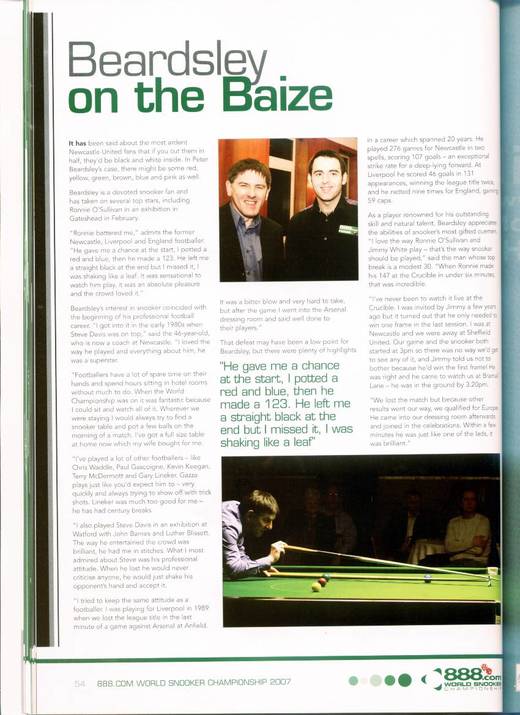
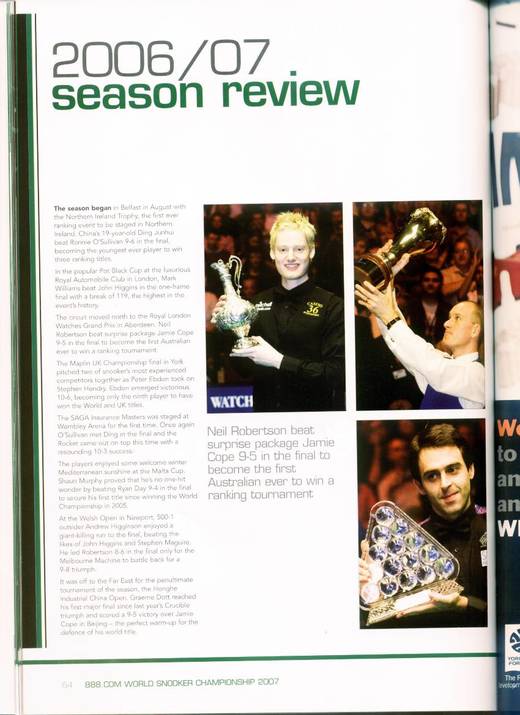
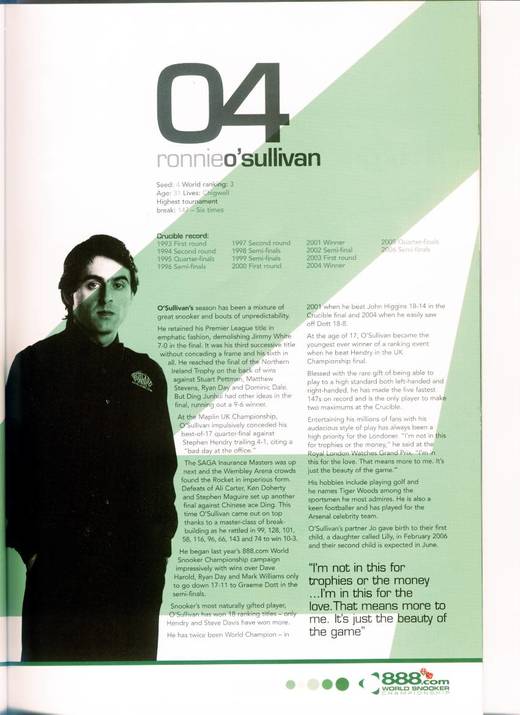
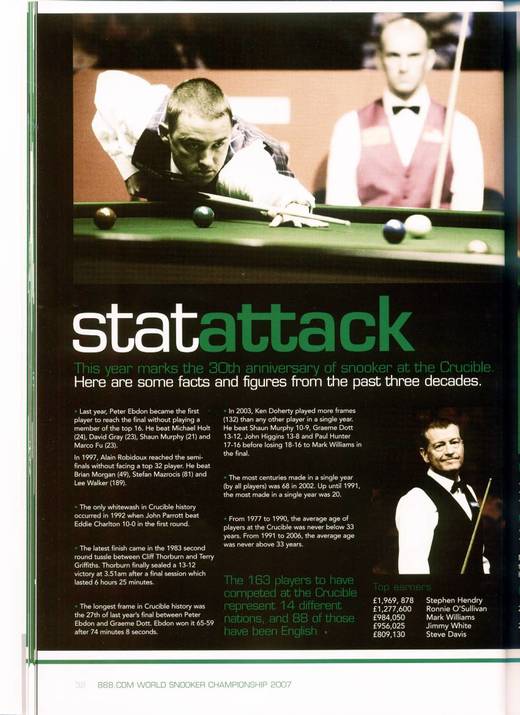
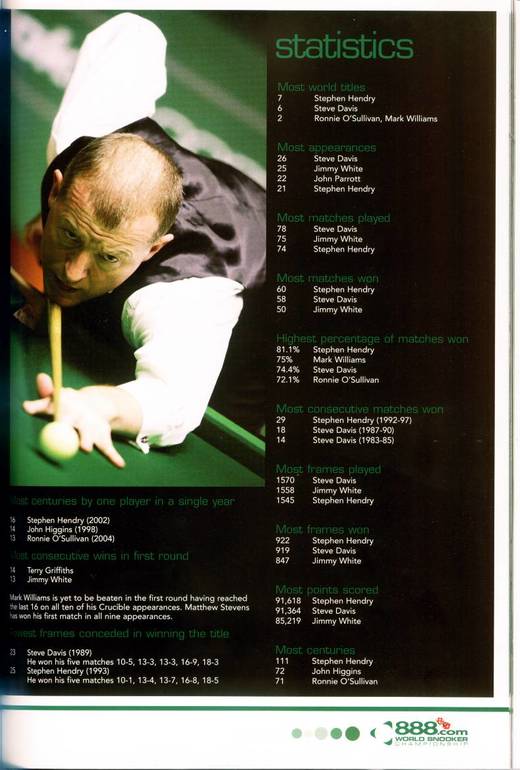
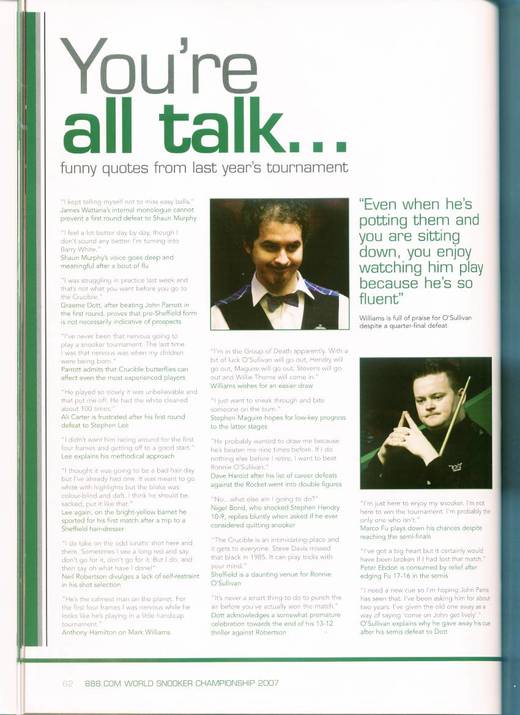
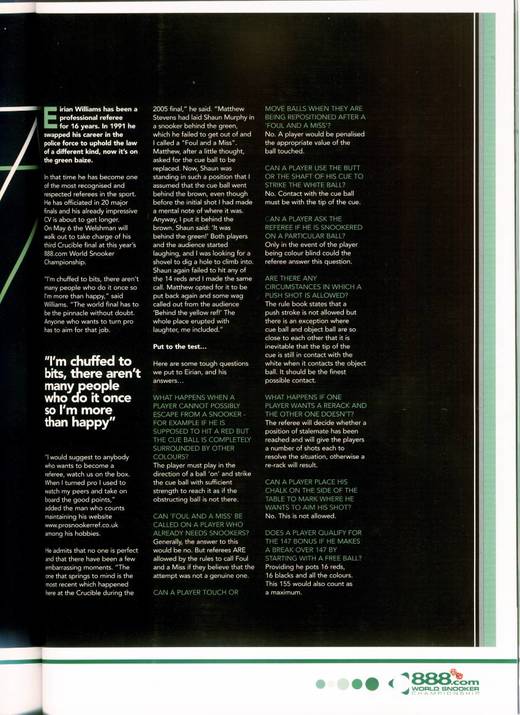

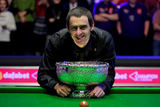
![Welsh Open[2].jpg](image.php?nid=1380&oid=3689245&width=160&height=174)
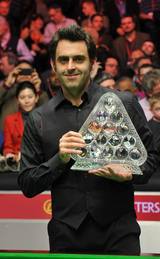

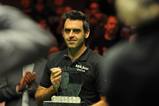
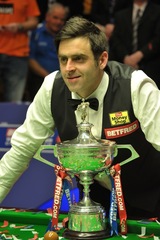
![Ronnie_OSullivan_Snooker_Champion_PTC7_2011[2].jpg](image.php?nid=1380&oid=2439625&width=160&height=151)
![topimage[2].jpg](image.php?nid=1380&oid=2498497&width=160&height=141)
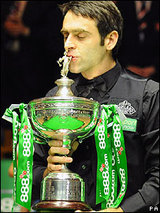
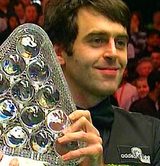
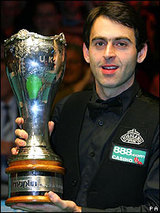

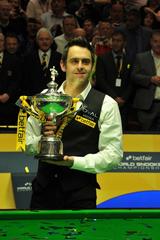

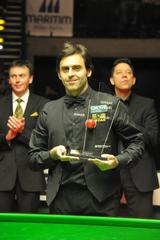

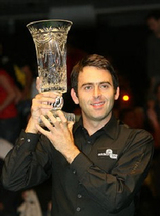
![08%20pls%20ronnie%20trophy[3].jpg](image.php?nid=1380&oid=1189442&width=160&height=198)
